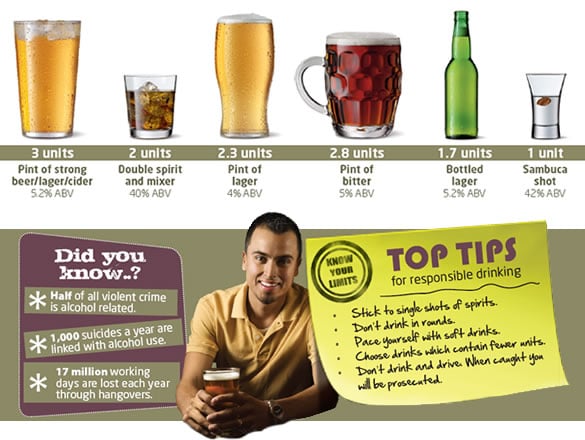Lads' Night Out


Half of all violent crime is alcohol related.
You might not be out of control but you can't control how other people behave when they're drunk. Half of all violent crimes are alcohol-related - and young men are particularly vulnerable.
Don't get caught up in it
Alcohol can make people more violent. So when you're out drinking, there's always a risk of getting into a fight.
To avoid trouble, remember:
- Don't feel under pressure to get drunk
- Be aware that when drunk you may appear threatening to others - which in turn may impact on how they behave towards you
- Avoid violence by talking your way out of potentially aggressive situations and avoid using aggressive body language or verbal communication
- Be aware that however much you feel able to look after yourself no-one should attempt to compete with weapons or gangs. If you find yourself in this situation, get away as fast as you can
If you start a fight, steal or damage property when you're on a night out bear in mind that the consequences can be severe. For a start, you may receive a criminal record. This could affect your freedom to travel and work.
You could also be issued with a fine, such as an FPN (Fixed Penalty Notice).
Here are some examples of fines:
- £50 if you drink alcohol in a 'no alcohol' public area, are drunk in the street or drink under the age of 18
- £80 if you harass, alarm or distress someone or behave in a disorderly way
- £80 if you are under 18 and try to buy alcohol or have it bought for you by someone else
- £80 if you vomit or urinate in the street
You may also be issued with an Anti-Social Behaviour Order (ASBO). Although it is a civil order, it is a firm measure to stop the behaviour that led to the order being made. This could involve you being banned from places you like to go to. If you fail to keep to the conditions of the order, you will have committed a criminal offence and you could go to prison for up to five years. To enforce the order your details could be given to the local community for their protection so they can tell the police or local authority if the terms of the order are broken.
Remember, too, that what you do when you're drunk doesn't just affect you. It affects the friends you're with, the people in the local area and the emergency services who might be called to deal with a situation you get involved in - when they could be helping someone else.
1000 Suicides a year are linked to alcohol use
Substance misuse has long been recognised as a risk factor for suicide and suicide attempts. Alcohol and drugs can affect thinking and reasoning ability, and can act as depressants. They can decrease inhibitions and increase the likelihood of a depressed person making a suicide attempt.
A 1999 report by the Department of Health found that, among suicides outside of a hospital setting, 38 per cent had a history of alcohol misuse. Estimates suggest that about 15 per cent of people who misuse alcohol may eventually kill themselves.
Research suggests that men are nine times more likely than women to misuse alcohol, and men diagnosed with alcoholism are six times as likely to die by suicide as men in the general population.
Alcohol and drugs are thought to be of particular significance in suicides that appear to be impulsive, and are particularly implicated in suicides of young men. But whatever the problem there is help available, so if you are feeling down don’t have a drink, talk to someone instead. You can telephone the Samaratians on 08457 909090.
“If you are feeling depressed, feel you cannot wait to see your GP and need to access immediate support and advice you can contact the Mental Health Gateway Service on 522214.”
17 Million working days lost Through Hangovers
You may have taken the odd sickie after a heavy night out but 25% of people seeking help for substance misuse problems are in work. Poor time keeping or odd days off here and there could be a sign that alcohol is affect your ability to do your job well. Even if you drink out of work or in small amounts it could influence your behaviour for hours afterwards. If you or a colleague are misusing alcohol you could be putting yourself, other people at work and customers in danger.Particularly if you work in a safety critical industry such as construction or transport.
If you or a colleague have an alcohol or drug problem it is your responsibility to do something about it. The Health and Safety at Work Act 1974 stresses that it is your responsibility to protect yourself and others affected by your actions.
Drug and alcohol problems are classed as medical problems so, under the Data Protection Act 1998, your employer should treat your problem as confidential. If you want to talk about how specific drugs and alcohol affect you and your work, or you want to talk about a drug or alcohol problem visit www.talktofrank.com or call 0800 77 66 00.





